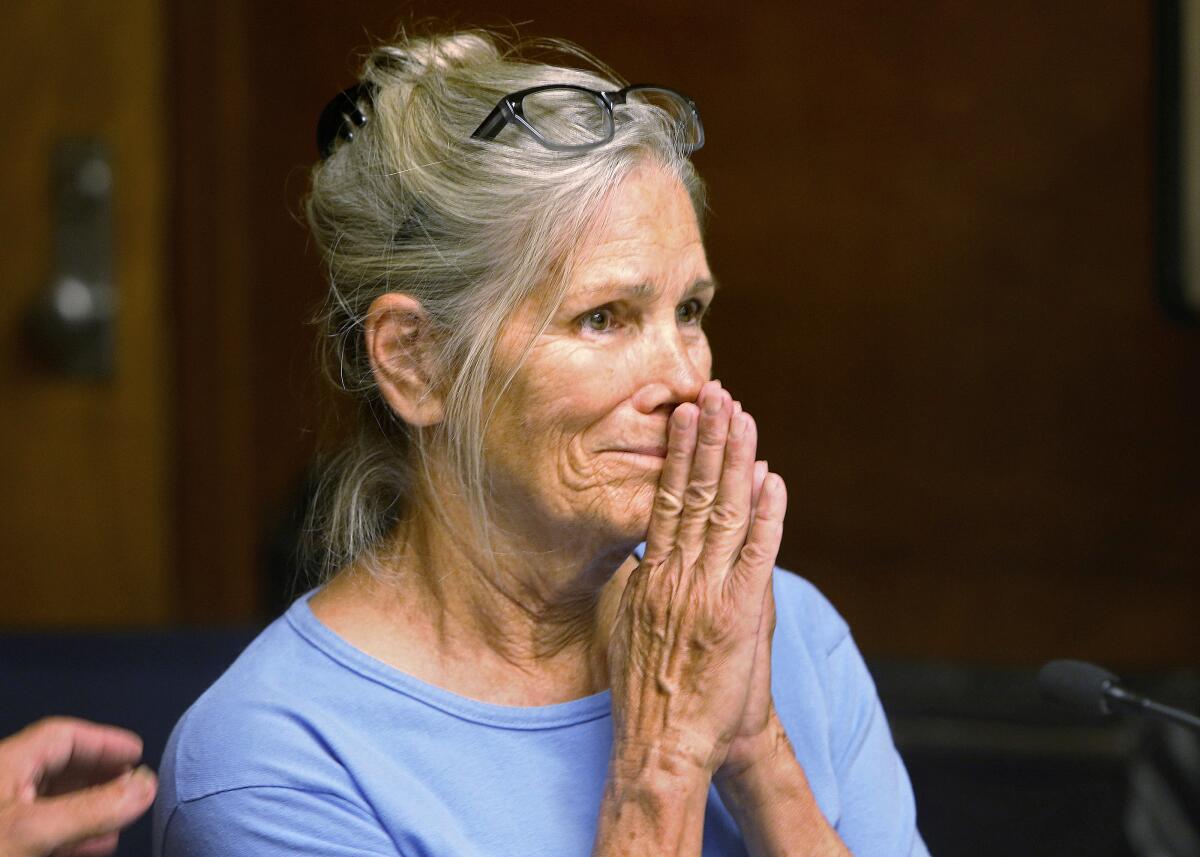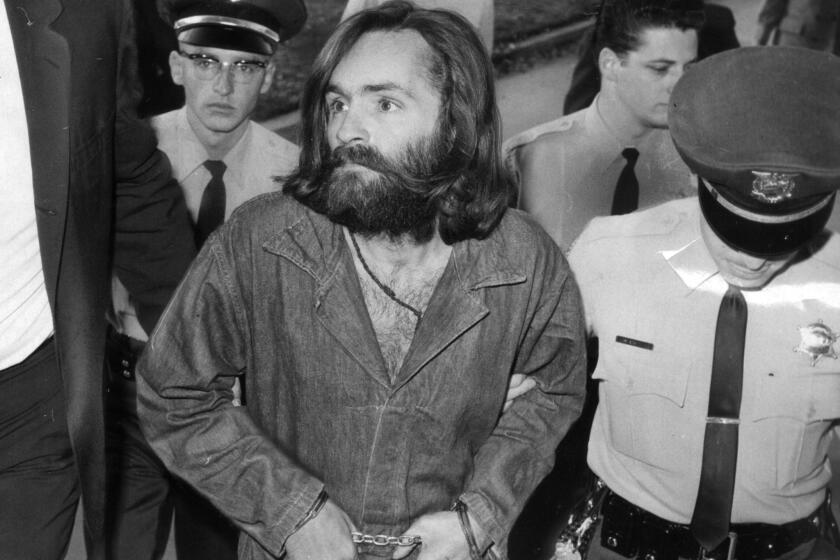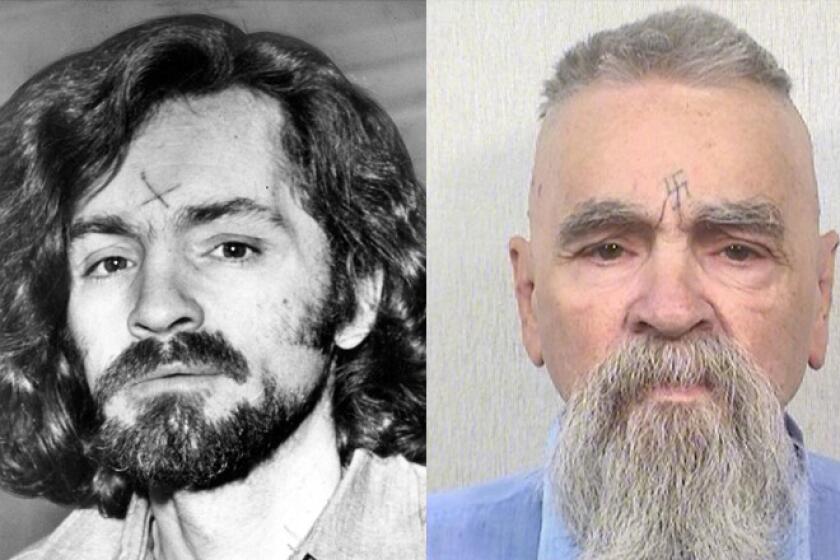Newsom will not contest parole for former Manson follower Leslie Van Houten

- Share via
Gov. Gavin Newsom will not challenge a California appellate court’s decision to allow parole for Leslie Van Houten, moving the former follower of Charles Manson closer to release after more than 50 years behind bars.
“The governor is disappointed by the Court of Appeal’s decision to release Ms. Van Houten, but will not pursue further action as efforts to further appeal are unlikely to succeed,” Newsom’s communications director, Erin Mellon, said in a statement Friday.
Newsom has on three previous occasions rejected parole for Van Houten, 73, who is serving a life sentence for helping Manson and members of the cult leader’s “family” kill Los Angeles grocer Leno LaBianca and his wife, Rosemary, in August 1969.
Van Houten, who was 19 at the time of the murders, put a pillowcase over Rosemary LaBianca’s head and stabbed her more than a dozen times. The group of Manson followers also smeared the LaBiancas’ blood on the walls of the couple’s Los Feliz home.
Read our full coverage of the Manson murders.
Manson and his followers were sentenced to death in 1971, but the sentences were commuted to life in prison after capital punishment was ruled unconstitutional in 1972.
Since then, Van Houten has been recommended for parole several times and has had more than two dozen parole hearings. Each recommendation was denied by Newsom or his predecessor, Gov. Jerry Brown.
The May decision by the 2nd District Court of Appeal marked the first time a court had overruled a governor’s denial of parole to a Manson follower.
Newsom’s rejection, judges for the appellate court wrote, failed “to account for the decades of therapy, self-help programming and reflection Van Houten has undergone in the past 50 years.”
Newsom, who denied Van Houten’s last parole recommendation in 2022, would have needed to file a petition to the California Supreme Court to contest the appellate court’s decision.
“More than 50 years after the Manson cult committed these brutal offenses, the victims’ families still feel the impact, as do all Californians,” Mellon said.
A California appeals court reversed Gov. Gavin Newsom’s decision to deny parole for Leslie Van Houten, a follower of cult leader Charles Manson.
Nancy Tetreault, an attorney for Van Houten, told the Associated Press that she could be released from the California Institution for Women within a couple weeks, pending parole board reviews and paperwork. Van Houten will then spend about a year living in a halfway house as she learns skills necessary for modern daily life, such as using a smartphone and getting a debit card, Tetreault said.
A Southern California native, Van Houten graduated from Monrovia High School. Her parents divorced when she was 14 and she began taking drugs, including LSD. At 17, she became pregnant and had an abortion.
Beginning in 1968, she started living lived on Spahn Ranch in Chatsworth, a headquarters for Manson and his followers.
Van Houten initially described the commune as “idyllic” but said it had a “sinister side,” with Manson espousing beliefs in a “race war” between Black and white people. Manson believed the “family” had to start killing white people to start the race war.
In the summer of 1969, Charles Manson and his murderous “family” went on a rampage in Los Angeles that left nine people dead.
Though Van Houten was involved in the LaBianca murders, she was not in attendance the previous night, when Manson’s followers killed five people at the Benedict Canyon home of film director Roman Polanski, including his pregnant wife, actress Sharon Tate; and her friends Jay Sebring; coffee heiress Abigail Folger; Folger’s boyfriend, Voytek Frykowski; and Steven Parent.
The dual crimes came to be known as the “Tate-LaBianca murders,” and horrified and fascinated the nation. Five people were ultimately convicted of the murders, including Manson, who died of natural causes in prison in 2017.
Van Houten’s original case was overturned on appeal, but she was later convicted of murder and conspiracy.
According to the judges’ ruling in May, Van Houten worked as a tutor and earned her master’s degree in humanities while incarcerated. She also participated in various mental health and self-help programs.
Outside a single write-up in 1981 for “verbally communicating with women,” she had a spotless disciplinary record during her time in custody, officials said.
Times staff writer Summer Lin contributed to this report.
More to Read
Sign up for Essential California
The most important California stories and recommendations in your inbox every morning.
You may occasionally receive promotional content from the Los Angeles Times.














